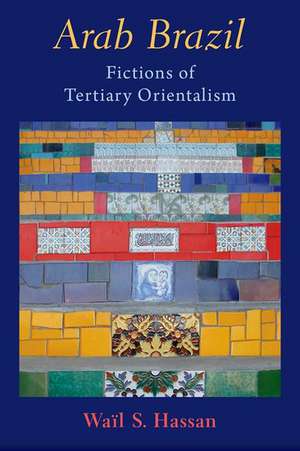Arab Brazil: Fictions of Ternary Orientalism
Autor Waïl S. Hassanen Limba Engleză Hardback – 19 iun 2024
Preț: 373.39 lei
Preț vechi: 512.17 lei
-27% Nou
Puncte Express: 560
Preț estimativ în valută:
71.48€ • 74.58$ • 59.92£
71.48€ • 74.58$ • 59.92£
Carte disponibilă
Livrare economică 10-15 februarie
Livrare express 05-11 februarie pentru 97.15 lei
Preluare comenzi: 021 569.72.76
Specificații
ISBN-13: 9780197688762
ISBN-10: 0197688764
Pagini: 344
Dimensiuni: 221 x 150 x 31 mm
Greutate: 0.64 kg
Editura: Oxford University Press
Colecția OUP USA
Locul publicării:New York, United States
ISBN-10: 0197688764
Pagini: 344
Dimensiuni: 221 x 150 x 31 mm
Greutate: 0.64 kg
Editura: Oxford University Press
Colecția OUP USA
Locul publicării:New York, United States
Recenzii
Arab Brazil is a theoretically sophisticated and elegantly written assessment of what Brazilian and Arab-Brazilian writings and television tell us about how Brazilian culture understands the Arab world and how the presence of Brazilians of Arab origin highlights the limits of the Brazilian ideal of mistura. On the one hand, Hassan's study astutely explains Brazilian Orientalism as one that is ternary, in the sense that it is not based on binary opposition, but on a triangulation in which Europe and North America remain at the apex. On the other hand, this book demonstrates that many of the manifestations of Brazilian Arabness, whether mathematics textbooks, novels, or television series, due to their stereotyping and Islamophobia, point to the fact that mistura is still only aspirational.
Waïl Hassan argues that Arab Brazilians feel effects of a ternary Orientalism, which adds the Global South to the standard Brazil-Europe post-colonial sphere. While deep ancient roots of Arabic culture and language in Iberia gave Arab immigrants to Brazil a special status, promoted by novelist Jorge Amado, other authors repeated images of European Orientalism to exoticize them, thereby disrupting a national self-definition based on mixture and assimilation. Hassan brilliantly follows their fictional portrayal from early Arab Brazilian novelists to prominent works by major novelists including Raduan Nassar, Milton Hatoum, Nélida Piñón, and Alberto Mussa. Arab Brazil brings the wide range of Arab immigrants into the center of Brazilian literary and social history.
It is hard to overstate the value and significance of Waïl Hassan's fine new book. By bringing a rigorous comparative perspective to the critical study of the enduring and salient presence of Islam and Arabic culture in the literary and popular cultural production of a majority Catholic country spanning the last one hundred years, Hassan crucially addresses a long-standing scholarly gap in literary studies. But Arab Brazil goes considerably beyond filling a scholarly gap. It succeeds in moving both Luso-Brazilian and postcolonial literary and cultural studies in a provocative new direction by incisively exploring the fundamentally different form that "Orientalism" assumes in Brazil. Hassan's book will prove of inestimable value not only to scholars of Luso-Brazilian literary cultural studies but postcolonial studies more generally.
Waïl Hassan argues that Arab Brazilians feel effects of a ternary Orientalism, which adds the Global South to the standard Brazil-Europe post-colonial sphere. While deep ancient roots of Arabic culture and language in Iberia gave Arab immigrants to Brazil a special status, promoted by novelist Jorge Amado, other authors repeated images of European Orientalism to exoticize them, thereby disrupting a national self-definition based on mixture and assimilation. Hassan brilliantly follows their fictional portrayal from early Arab Brazilian novelists to prominent works by major novelists including Raduan Nassar, Milton Hatoum, Nélida Piñón, and Alberto Mussa. Arab Brazil brings the wide range of Arab immigrants into the center of Brazilian literary and social history.
It is hard to overstate the value and significance of Waïl Hassan's fine new book. By bringing a rigorous comparative perspective to the critical study of the enduring and salient presence of Islam and Arabic culture in the literary and popular cultural production of a majority Catholic country spanning the last one hundred years, Hassan crucially addresses a long-standing scholarly gap in literary studies. But Arab Brazil goes considerably beyond filling a scholarly gap. It succeeds in moving both Luso-Brazilian and postcolonial literary and cultural studies in a provocative new direction by incisively exploring the fundamentally different form that "Orientalism" assumes in Brazil. Hassan's book will prove of inestimable value not only to scholars of Luso-Brazilian literary cultural studies but postcolonial studies more generally.
Notă biografică
Waïl S. Hassan is Professor of Comparative Literature at the University of Illinois Urbana-Champaign. Among other books, he is the author of Immigrant Narratives: Orientalism and Cultural Translation in Arab American and Arab British Literature, editor of The Oxford Handbook of Arab Novelistic Traditions, and Portuguese-to-Arabic translator of Alberto Mussa's Lughz al-qaf. Hassan is a past president of the American Comparative Literature Association.
